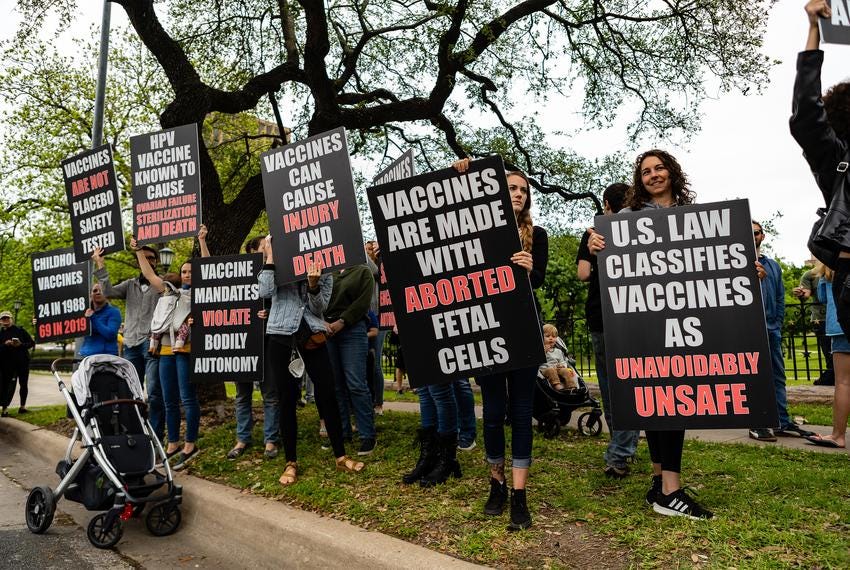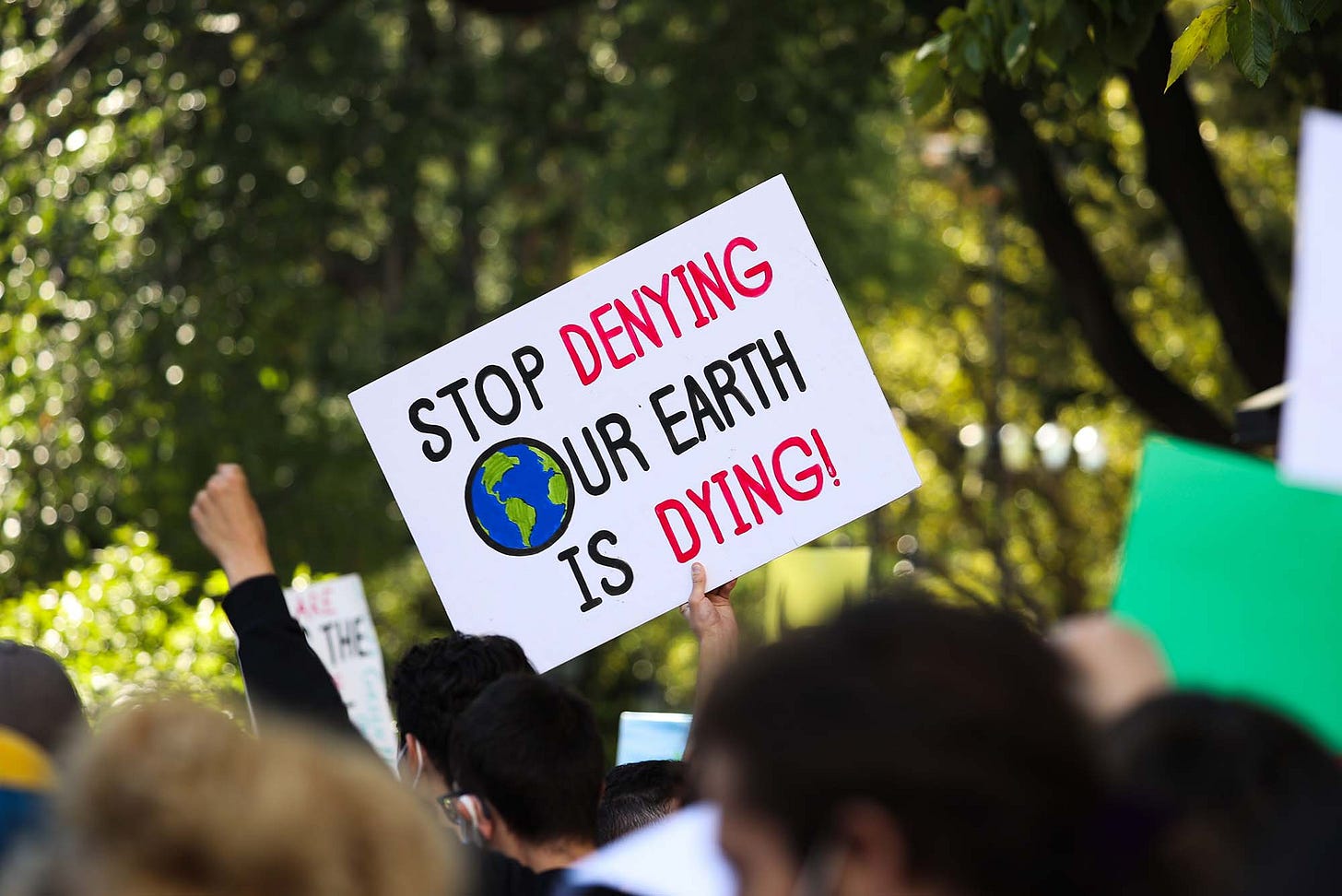Jack Bowe: Why I Don’t Believe in Science
I don't believe in science, and you (probably) shouldn't either.
Unexpected, right? Well, it’s true; I do not believe in science. And I don’t have faith in scientists. The rationale behind my statement might contrast with your current perception. When I express that I don’t believe in science, I mean that science is not a belief system. It’s not a matter of what I think or disbelieve, as it doesn’t align with the concept of belief. A video clip from September 14, 2020, has recently resurfaced, showing a panel of masked California fire officials and California Natural Resources Agency (CNRA) members alerting then-President Trump to the threats global warming poses to California’s wilderness. Known climate science expert Donald Trump’s response? “It will start getting cooler. You just watch.” A desperate CNRA Secretary Wade Crowfoot pleads with Trump: “I wish the science agreed with you.” A laughing Trump continues down the perilous rabbit hole of denial. This incident underscores the need for public understanding of science and effective science communication. Upon hearing about the potential life-threatening fires in California’s future, the President of the United States says, “Oh well, I don’t think science knows, actually.”
As I write this on January 13, 2024, we are six days into one of California’s worst fire seasons, with sixteen American lives lost so far. Amid dry weather and low humidity, the flames have devastated the Pacific Palisades, Pasadena, and other parts of the Los Angeles Metropolitan region, just over four years after Trump’s famous last words: “Oh well.”
Someone like Donald Trump would glance at the title of this article and proceed in agreement, missing the point. I am not a scientist. I am a 19-year-old political science student at the University of Toledo in Toledo, Ohio. I have more science education than Donald Trump, with one semester of pre-medicine coursework: biology, chemistry, calculus, and neuroscience. Yet, even the most inexperienced scientist could outshine me in the lab. It’s like that Brian Scalabrine quote, “I may suck as an NBA player, but you suck compared to me. I suck compared to [NBA stars]. I’m closer to Lebron than you are to me.” I suck compared to the worst scientist. So, again, to reiterate, I am not a scientist. But the key point here is the role of expertise. As a non-scientist, like many others, I don’t possess the expertise to question the conclusions of scientists who devote their lives to research. This expertise is crucial in understanding and addressing the complex issue of climate change. Not only do I lack the knowledge to challenge or dispute their claims, but for the most part, I also lack the knowledge necessary to understand and confirm their claims entirely. I can merely listen, attempt to comprehend, and then acknowledge the scientific community’s consensus.
In the United States, we rely on our elected representatives to enact environmental protections that safeguard humans worldwide from their own actions. There’s only so much an individual can do. You can buy an electric car, use reusable kitchen utensils, or ride your bike to work, but these actions are relatively insignificant. We must implement public policy prioritizing environmental protection to create effective change. Climate change has been a contentious issue for years, but we listened to the scientists, or at least it seemed we did. We deferred to them in cabinet meetings at the White House, called them to testify in our congressional committee meetings, and ensured they weren’t left in the dark when drafting legislation. However, politicians, particularly on the right, have increasingly become anti-science, anti-scientist, and anti-innovation. Where did this all begin? The answer is glaringly apparent: COVID.
In 2020, conservatives were told the last thing they wanted to hear. That’s right, the government is slightly restricting your freedoms to do minor things to protect hundreds of millions in our country and billions around the world from an extraordinarily dangerous virus that we can’t seem to stop from spreading.

Why did COVID-19 become partisan? Are all people not equally likely to be upset about wearing masks, needing to stay indoors, or working from home? COVID affected us all in (about) the same way, right? Here is the clear difference: more people on the left could balance the cons with a few pros. The pros of following COVID restrictions appealed to liberals, such as protecting human lives, getting back to normalcy as soon as possible, keeping people out of the hospital, protecting healthcare workers, and on and on and on. Conservatives had two main gripes with the pros of following COVID rules. Firstly, they don’t care about others, and second, they don’t believe anything terrible will happen to others. Most conservatives agree with one or both of the above opinions. How could the right fight back without seeming selfish and careless about society? Denying the facts. Not investigating the truth and challenging the scientific consensus, but just by lying. The right became masters of the undefeatable “nuh-uh.” Since then, statistics don’t matter. Facts don’t matter. The scientific consensus doesn’t matter. How can we possibly have good-faith, productive conversations with conservatives if we aren’t both grounded in reality? When one side defends their opinions with empirical data and the other can only falsely claim that “those numbers are falsified,” we cannot continue striving for a better country.
So, back to my original statement. I already explained why I don’t say that I “believe in science.” However, I also said that I don’t have faith in scientists. Let’s define faith. Merriam-Webster dictionary defines faith as an “allegiance to duty or a person, loyalty.” I have no allegiance to scientists, I have no stake in what results they may or may not produce, and I owe no loyalty to the field. Another definition calls faith a “firm belief in something for which there is no proof.” I, of course, take issue with saying that I have faith in scientists when this definition is up in the air. Science is the exact opposite of that definition. I have never, and will never, “firmly” believe in something for which there is no proof.
I can lose my ego and admit when I am unqualified in a particular field or subject. Many people (the ones we do not see on television) can do this. For this reason, I lack any belief or nonbelief in science and faith in scientists. I bear no allegiance to scientists or their research. I am loyal to the truth: verifiable truth supported by empirical data and reported by experts.
So, the next time a conservative, pseudoscientist, conspiracy theorist, or anyone else tells you that they don’t believe in science, tell them you don’t either and walk away. Better yet, say, “How about you go back to school, get a Ph.D., start your own lab, and author peer-reviewed publications on the subject you’re so passionate about?” See how fast the conversation concludes.



